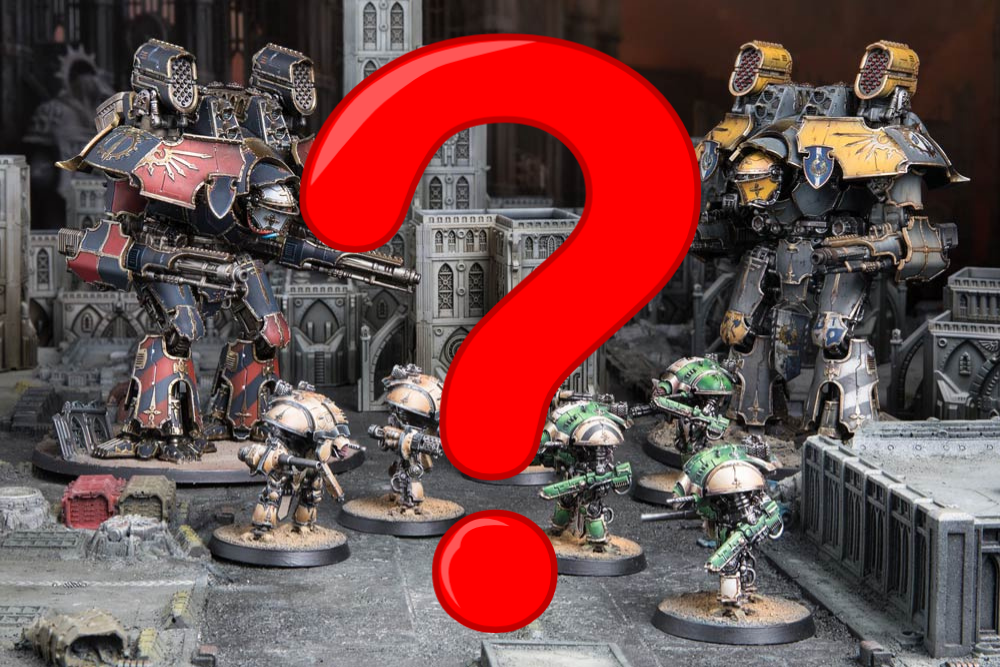Warhammer Community
A year ago, I purchased Game’s Workshop Adeptus Titanicus game. It looked cool (and is), and I thought it would be a good way to dip my toe into the Warhammer 40k universe. While the game is wonderful, the problem I was faced with was figuring out what factions I would paint my Titans. The game provided some very generic background, but not enough to really make a good call. I went to several websites and was immediately overwhelmed. There were novels, a LOT of them. I asked some fans where to start and got, and I’m not exaggerating here, no less than 25 suggested starting places in the franchise. Finally, I just picked some color schemes from some factions that looked cool and went with those. I no longer care about the factions, or if their Titans would ever fight each other. I went for what colors looked cool.
I had a variant of an entry barrier issue with Flames of War. I bought the rules, but that wasn’t enough. I had to purchase books for the forces I wanted to field. Then came the dice, the artillery templates, etc. I purchased the minis, painted them, and then found out they had moved to a new version of the rules. Now I needed a new rules book, decks of cards…ugh!

Wargames Illustrated
Jason Weiser, who masterfully contributes to this blog, recommended Battlegroup rules to me. I got the rules book (and love the system), but I also now needed a campaign book to actually play. This was a small entry barrier – but it was there. I was surprised that Plastic Soldiers didn’t offer a bundle – the rules and a campaign book sold together. I would have gladly spent the money to get everything I needed in one shot.
As a longtime writer for BattleTech I often see people who ask, “Where do I get started?” It’s not easy. First, fans don’t necessarily agree with what novels you should start with. Others argue about eras, which determine what rule sets or books you might need. Yes, there is a beginner’s boxed set, but that is set at a certain tech level which might not be where the players want to jump in. All of this makes it difficult for new players to join in on the fun because the entry barrier can be so daunting.
Dungeons and Dragons cracked this nut a long time ago. As a player, you need the Players Handbook. If you are running the game – you need the Dungeon Masters Guide and Monster Manual. Everything else is a voluntary add-on. I played D&D for years without knowing what the Forgotten Realms were, nor did I care. The low entry barrier for D&D has been a massive part of its success. It has allowed generations of players to hop in, regardless of the current version, and start playing.

Dicebreaker
Oddly, many companies seem to ignore this relatively simple concept. What game companies that have product lines need to do is get better at producing materials to lower the entry barrier for new players. A primer to the game is a good starting point – but it isn’t enough. Players want to know what components, at the bare minimum, are needed to play. Companies should bundle these components as a package that players can purchase. Boxed sets for entry can be a great starting point, but new players come in with no background, and most boxed sets lack the depth needed for many. They don’t know the flavors and flair of various factions.
When you are dealing with long-standing and large intellectual properties, like Warhammer 40k and BattleTech, you need to provide lists of novels and sourcebooks that are ‘essential’ vs. ‘great to read.’ Guidance needs to be provided for players to help them make a choice as to the time era they might want to explore. Players want to know, “if I pick this faction or this era, what do I need to consume.” The game companies need to make that easier – with some customized product bundling that can help new players assimilate quickly.
Nothing replaces meeting other players and asking them about the universe, but the game companies could do a lot to get players into the game quickly and easily. Gamers are more than willing to pay to jump into a game, as long as the money is well spent. Game companies have an obligation to make that as easy and simple as possible. It’s not about loading up web pages with lore. It is about providing good guidance and making it super-easy.
–
At Epoch Xperience, we specialize in creating compelling narratives and provide research to give your game the kind of details that engage your players and create a resonant world they want to spend time in. If you are interested in learning more about our gaming research services, you can browse Epoch Xperience’s service on our parent site, SJR Research.
–
This article is credited to Blaine L. Pardoe. Mr. Pardoe is a longtime gamer and has written material for numerous RPG’s and game systems over the years and is an award-winning author and historian. He is a New York Times bestselling author and has presented on historical subjects at the US Naval Academy, the US National Archives, and other prestigious venues.


